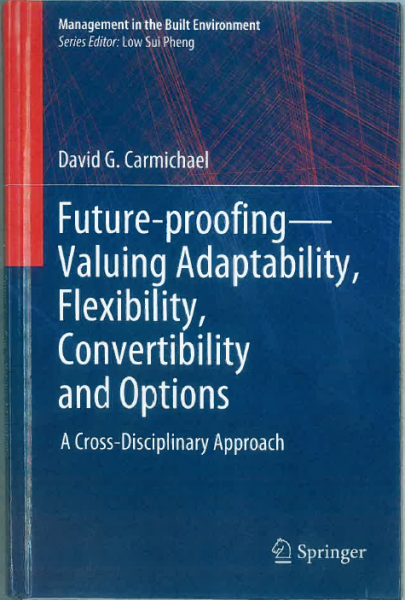Original new thinking for infrastructure usage and longevity

Professor David Carmichael is a leading engineering management expert, who has written and edited twenty-three books and over two hundred papers in structural and construction engineering and construction and project management. His major consultancy work has included the structural design and analysis of civil and building structures; the planning and programming of engineering projects; the administration and control/replanning of civil engineering projects and contracts; and various construction and building related work.
His latest book, Future-proofing - Valuing Adaptability, Flexibility, Convertibility and Options A cross-disciplinary approach (published by Springer Nature, Singapore 2020) deals with increasing adaptability in several areas: adaptable civil infrastructure, adaptable buildings and houses, impacts and changes in project delivery and financial systems, convertible legal contracts, while also looking at financial, energy and real estate options.
Carmichael notes that his work covers totally original ground. "The book's content points the way to better and longer usage of our infrastructure," he says.
The book presents a unifying approach to the valuation of incorporated flexibility. Flexibility, in general terms, recognizes future uncertainty and refers to being proactive now so as to secure the future possibility of being able to adapt, convert, or generally introduce a change, if it is worthwhile to do so at the time. That is, deliberate provision is made now in order to have the ability (but not the obligation) to adapt, convert, or change in the future. Making these changes, among other things, can delay obsolescence – physical, economic, functional, technological, environmental, social, or legal.

The examples given in the text include: designing/building features in infrastructure (including buildings and houses) such that the infrastructure can be adapted in response to future changes in climate, demographics, or usage; incorporating features in contracts such that the terms and conditions can be changed in response to changing situations; purchasing rights now such that options exist to buy or sell an asset in the future; structuring a financial investment agreement so that its terms and conditions can be changed in the future; structuring project payments to provide future guarantees of revenue if needed; and designing an operation such that it can be expanded, contracted, abandoned, switched, changed, delayed, or deferred in the future.
Professor Carmichael's book, being multidisciplinary, will be of interest to anyone involved in future-proofing, assets, investment and management. The level of required mathematics is kept at a very modest level: an undergraduate knowledge of algebra and probability is all that is required. Numerical examples, accompanied by readily understandable diagrams, illustrate the methods outlined. The formulations are kept straightforward and accessible for practitioners and academics alike.
The book can be ordered from https://www.springer.com/gp/book/9789811507229



